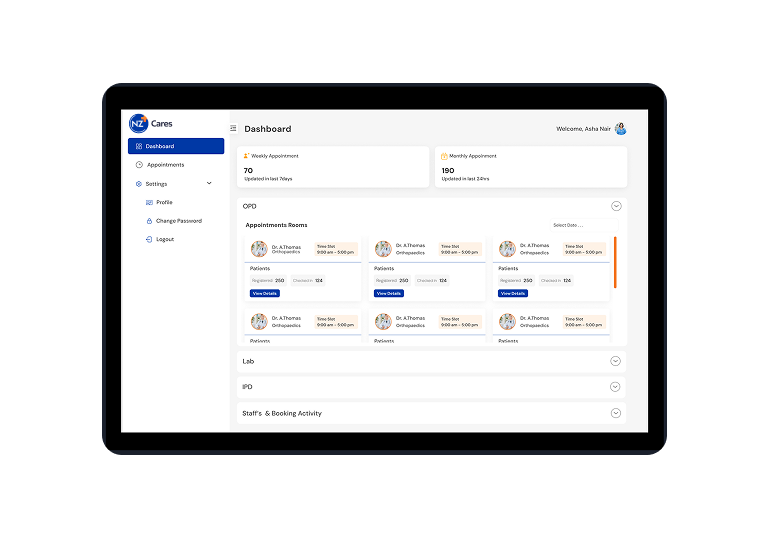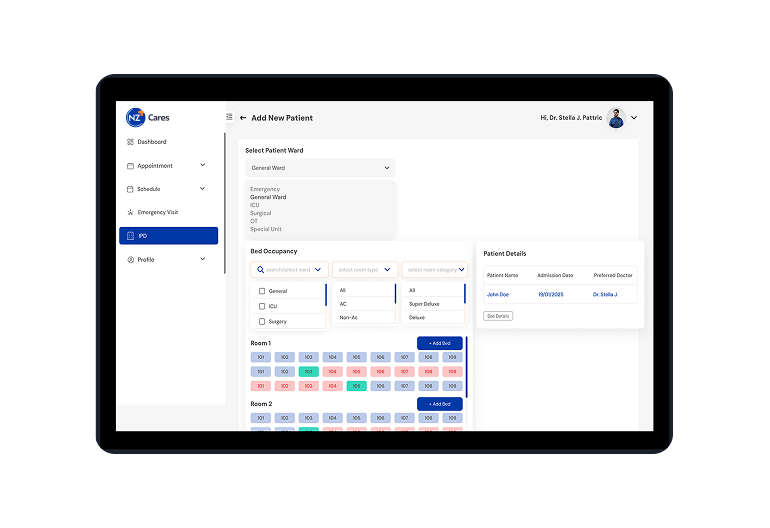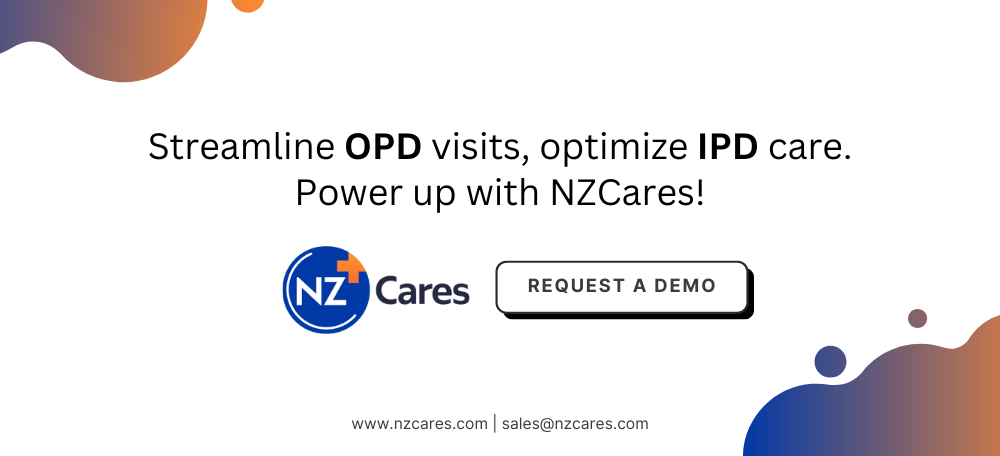Explore the key differences, workflows, and how NZCares enhances efficiency for both inpatient and outpatient care.
Understanding the healthcare industry can be tricky, especially with terms like IPD vs OPD. While essential for healthcare professionals, it’s just as important for patients to understand these differences to make informed decisions and improve communication with providers.
In simple words, IPD refers to the Inpatient Department, where patients are admitted for overnight stays or extended treatment. On the other hand, OPD, or the Outpatient Department, handles patients who receive care and leave on the same day.

What is OPD (Outpatient Department)?
The Outpatient Department, or OPD, serves as the first point of contact for patients seeking medical care without requiring an overnight hospital stay.
“What does OPD stand for” is a question many patients ask.
And, here’s the answer.
It’s where you go for same-day medical services. The primary purpose of the OPD is to provide accessible and efficient healthcare for a wide range of needs.
Doctor consultations, minor procedures, diagnostic tests, and follow-up appointments are some of the common services offered in the OPD setting.
For example, a patient visiting a hospital to get a routine check-up, a consultation with a specialist, or a diagnostic test like an X-ray or blood work. In this case, the patient needs to contact the hospital’s OPD department.
NZCares OPD Workflow
NZCares’ Smart HMS streamlines the OPD experience, ensuring a seamless journey for both patients and healthcare providers:

-
Online Appointment Booking via NZCares Smart HMS:
Patients can easily schedule appointments online, eliminating the need for lengthy phone calls and reducing wait times. -
Digital Patient Registration:
Upon arrival, patients can complete their registration digitally, saving time and reducing paperwork. -
Doctor Consultation & E-Prescription:
Doctors can access patient records quickly and efficiently, providing consultations and issuing e-prescriptions digitally. -
Digital Billing & Online Payment:
Patients can view their bills and make payments online, simplifying the financial aspect of their visit. -
Follow-up Reminders via NZCares:
Automated follow-up reminders ensure patients adhere to their treatment plans and schedule necessary follow-up appointments.
What is IPD (Inpatient Department)?
The Inpatient Department, or IPD, is where patients are admitted to the hospital for continuous medical care and monitoring that requires an overnight stay or an extended period.
“IPD medical” services are for those patients with more complex healthcare needs. This department plays a crucial role in managing conditions that demand intensive treatment, surgeries, and post-operative care.
When discussing IPD vs OPD, it’s important to note that IPD typically involves more intensive care and longer stays. Common cases of IPD admission include surgical procedures, critical illnesses requiring intensive care, and recovery from major treatments.
For instance, a patient undergoing surgery and needing a 5-day hospital stay for recovery and monitoring would fall under IPD care, unlike OPD, which is suited for consultations and minor treatments without hospitalization.
NZCares IPD Workflow
NZCares’ HMS optimizes the IPD workflow to ensure efficient patient management and seamless coordination between healthcare professionals:

-
Digital Admission Process via NZCares:
The admission process is streamlined with digital registration and documentation, reducing paperwork and wait times for patients. -
Bed & Treatment Management:
NZCares facilitates efficient bed allocation and management, ensuring that patients are assigned to the appropriate rooms and receive timely treatment. -
Integrated Doctor & Nurse Dashboard for Real-Time Monitoring:
Doctors and nurses have access to a centralized dashboard that provides real-time updates on patient vitals, medications, and treatment plans, enabling better coordination and proactive care. -
Seamless Billing & Insurance Claim Management:
NZCares simplifies billing and insurance claim processing, reducing administrative burden and ensuring timely reimbursements. -
Discharge & Digital Medical Record Access:
Upon discharge, patients receive digital access to their medical records, ensuring continuity of care and easy sharing of information with other healthcare providers.
IPD vs OPD: Key Differences Between OPD and IPD
While both Outpatient (OPD) and Inpatient (IPD) departments play vital roles in a hospital, they serve different purposes and cater to varying healthcare needs. Understanding these differences can help you determine which type of service is right for you.
Think of it this way:
-
OPD is like visiting your doctor’s office. You schedule an appointment, receive a consultation or treatment, and then head home the same day. This is for less serious issues or routine checkups.
-
IPD is for when your condition requires more intensive care and monitoring. Imagine needing surgery or having a serious illness that requires ongoing medical attention. In these cases, you’d be admitted to the hospital and stay overnight or even longer.
IPD vs. OPD: Which is Right for You?
-
In-Patient Department (IPD):
For serious conditions requiring hospitalization and overnight stays. Suitable for surgeries, critical care, and conditions needing 24/7 monitoring. Examples: heart surgery, severe injuries, chronic illness exacerbations. -
Out-Patient Department (OPD):
For non-emergency treatments where you don’t need to stay in the hospital. It is ideal for consultations, routine check-ups, minor treatments, and ongoing care. Examples: cold, fever, follow-up visits, chronic disease management.
How NZCares Optimizes Both OPD & IPD Management
NZCares HMS offers a comprehensive suite of features that streamline and optimize both OPD and IPD management, enhancing efficiency and patient care:
-
Smart Appointment System:
NZCares’ AI-powered appointment scheduling system minimizes wait times for OPD patients, allowing clinics to optimize their schedules and see more patients efficiently. -
Automated Admission & Discharge:
For IPD patients, NZCares automates the admission and discharge processes, reducing paperwork, minimizing manual errors, and ensuring a smoother experience for both patients and staff. -
Real-Time Patient Monitoring:
NZCares provides real-time monitoring capabilities for IPD patients, allowing doctors and nurses to track vital signs, medications, and treatment progress seamlessly, enabling proactive interventions and improved care coordination. -
Integrated Billing & Insurance:
NZCares streamlines billing and insurance claim processing for both OPD and IPD services. This reduces administrative burden, minimizes errors, and ensures faster payments, improving the financial health of the healthcare facility. -
Teleconsultation & Follow-ups:
NZCares facilitates teleconsultations and automated follow-up reminders, ensuring continuity of care for patients beyond their physical visits to the hospital, and improving patient engagement and adherence to treatment plans.
Why Choose NZCares for Hospital Management?
NZCares stands out as a leading Hospital Management System due to its comprehensive features and focus on optimizing healthcare operations:
-
AI-Powered Efficiency:
NZCares leverages artificial intelligence to automate tasks, reduce administrative workload by up to 30%, and free up staff to focus on patient care. -
Real-Time Data Access:
The system provides real-time access to critical patient data, enabling faster decision-making, improved care coordination, and ultimately better patient outcomes. -
Secure & Compliant:
NZCares prioritizes data security and compliance with global healthcare regulations, including HIPAA and GDPR, ensuring patient privacy and data integrity. -
Scalable for All:
Whether you’re a small clinic, a diagnostic center, or a multi-facility hospital, NZCares offers scalable solutions to meet your specific needs and grow with your organization.
Conclusion
Efficient IPD and OPD management is essential for optimal patient care and hospital efficiency. NZCares streamlines these departments with AI-powered automation and real-time data access.
Experience the future of healthcare with NZCares. Connect with us for a DEMO.
